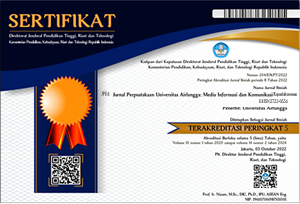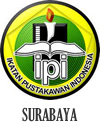Padjadjaran University Library Services During The Covid-19 Pandemic
Downloads
The early onset of covid-19 in 2020 causes a complete shutdown of all activities including those of services in the library to avoid direct contact with users in order to prevent the spread of this covid-19 virus. The purpose of this study is to fulfill the tasks that teachers have given you and to find out what innovations the unpad library has made to serve students or other users in spite of this covid-19 pandemic. The study USES descriptive qualitative methods on concepts related to library science, as well as to analyze the practices used in libraries during the pandemic. Data obtained through interviews conducted by researchers by sending some questions through the email of the unpad central library staff. The data already obtained will be presented in a descriptive form, so it will outline the importance of providing online library services by applying digital predating concepts. By subscribing to multiple journals and e-book databases, information-related services are still needed to support student and lecturer research, in this case libraries can engage in inter-library cooperation. During the pandemic, a university library service was required to transform from manual services into digital services.
Creswell, J. W. (2012). Research Design: Pendekatan Kualitatif, Kuantitatif, dan Mixed. Pustaka Belajar.
Daryono. (2018). Membangun komunikasi efektif dalam pelayanan perpustakaan. https://ejournal.perpusnas.go.id/mp/article/download/274/293
Depdiknas. (1994). Buku Pedoman: Perpustakaan Perguruan Tinggi. Direktorat Jenderal Pendidikan Tinggi Depdiknas.
Haryanto, H. (2019). Optimalisasi Layanan Perpustakaan Perguruan Tinggi Melalui Pemanfaatan Social Media Networking Sebagai Media Komunikasi Antara Perpustakaan Dan Pemustaka. Jurnal Pustaka Ilmiah, 1(1), 77. https://doi.org/10.20961/jpi.v1i1.33090
IFLA. (2018). IFLA/UNESCO Manifesto for Digital Libraries. The International Federation of Library Associations and Institution. https://www.ifla.org/publications/iflaunesco-manifesto-for-digital-libraries
IFLA. (2020). COVID-19 and the Global Library Field. Den Haag : IFLA (The International Federation of Library Associations and Institutions). https://www.ifla.org/covid-19-and-libraries
Istiana, P. (2014). Layanan Perpustakaan. 1–43.
K.E, P. (1998). Pendekatan Kualitatif Dalam penelitian Psikologi. Lembaga Pengembangan Sarana Pengukuran dan Pendidikan Psikologi (LPSP3) Fakultas Psikologi Universitas Indonesia.
Pendit, P. L. (2008). Perpustakaan Digital Perguruan Tinggi : Tantangan Peningkatan Kualitas Jasa. http://eprints.undip.ac.id/5367/2/makalah_pak_putu.pdf
PERPUS UNUSA. (2016). Tujuan dan Fungsi Perpustakaan Perguruan Tinggi. https://library.unusa.ac.id/2016/10/20/tujuan-dan-fungsi-perpustakaan-perguruan- tinggi/
S, N. (1987). Pengelolaan Perpustakaan.
Suharso, P. (2019). Pemanfaatan Drone Emprit dalam Melihat Trend Perkembangan Bacaan Digital melalui Akun Twitter. Anuva, 3(4), 333–346. http://ejournal.undip.ac.id/index.php/anuva%0APemanfaatan
Sulistyo-Basuki. (1993). Perpustakaan Perguruan Tinggi. Gramedia.
Copyright (c) 2021 JPUA: Jurnal Perpustakaan Universitas Airlangga: Media Informasi dan Komunikasi Kepustakawanan

This work is licensed under a Creative Commons Attribution-NonCommercial-ShareAlike 4.0 International License.
1. The journal allows the author to hold the copyright of the article without restrictions.2. The journal allows the author(s) to retain publishing rights without restrictions
3. The legal formal aspect of journal publication accessibility refers to Creative Commons Attribution- NonCommercial-ShareAlike: CC BY-NC-SA





















